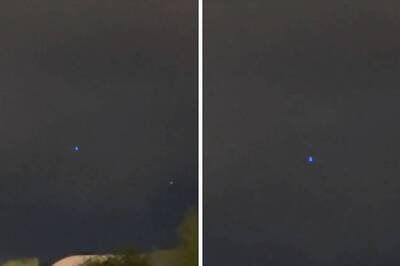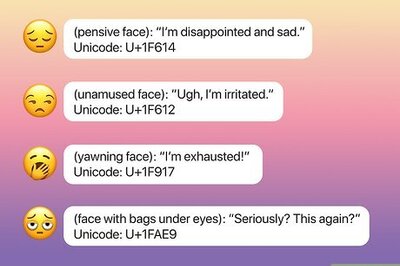Frozen Taps, and Bone-Chilling Cold: Kashmir Battles Chillai-Kalan, its Harshest Winter in 3 Decades

views
Srinagar: The harshest time of winter in Kashmir is called Chillai-Kalan—the 40-day-long period which begins on December 21 and ends on January 31.
The temperature in nights is below freezing point and during the day it is in the single digits.
This year, however, the winter is harsher in nearly three decades. On Thursday, in J&K’s summer capital, Srinagar the night temperature was recorded at minus 7.6 degrees—coldest December night in 28 years.
The life in Kashmir during winters is miserable. In this harsher winter, the water bodies including the Dal Lake go into a freeze. The water taps in the homes and the main supply lines are also getting blocked as the water running in them turns into ice.
On Friday, a 65-year-old man died in Anantnag district, apparently due to the cold. Police said that he was mentally challenged and had been seen wandering during the night.
The night Srinagar witnessed record cold, south Kashmir’s Anantnag recorded a low of -6.7°C. Famous tourist destination Pahalgam was the Valley’s coldest place at -9.5°C, the meteorological department said, while Gulmarg, Kashmir’s skiing haven, recorded a minimum temperature of -9.3°C. North Kashmir’s Kupwara was at -6.3°C.
From last five days, there is no water in the house of Mohammad Raafi, a resident of Hazratbal area of Srinagar city.
“The water pipes have frozen badly. The life this winter is really harsh,” said Raafi, adding, “It is for the first time in many years that taps have frozen so badly.”
People have to fetch water from different sources. In rural areas, the situation is worse.
“We have to travel half a kilometer to fetch water from a nearby spring. It is a bone-freezing task,” said a resident.
In the winter times, there is an additional risk of people falling sick. Chest disease, cold, fever is very common. Elderly and the children are most vulnerable.
In view of intense cold conditions here, directorate of health services Kashmir (DHSK) today issued a health advisory to guide people on reducing spells of sickness due to the temperature drop.
The advisory issued by DHSK has listed various steps aimed at helping people in Kashmir “staying safe and healthy this winter”. Warning that elderly, aged 65 and above, and infants were at high risk of developing cold-related complications, the advisory directs people to wear warm clothes as a basic. “Wear a scarf, hat and gloves,” it says while underlining the importance of keeping hands and feet warm.
The advisory has asked people to avoid exertion in cold weather, especially if a person is suffering from high blood pressure or heart disease. Reasoning that cold weather makes the heart work harder, people with these ailments have been directed to seek immediate medical attention in case of chest pain.
Dr Mohammad Salim Khan, who works at Government Medical College Srinagar, asked people to take adequate warm fluids to Prevent Dehydration.
“Due to intense cold, we put excessive clothing, which causes unrecognised sweating, plus use of warmers within rooms cause dry warm air, which causes more water loss from skin,” he wrote on Facebook. “On average, we lose around half a litre of water every day through breathing and skin (insensible loss) and we intend to take less water due to cold and reducing visits to loo. Elderly persons have decreased feedback mechanism to thirst, so they get dehydration unnoticed. Patients with uncontrolled diabetes, heart failure and kidney diseases, and those hypertensive patients using diuretics have high chances of dehydration,” he wrote.
Another danger which looms in winter is of asphyxiation due to the use of heating appliances.
On Friday, a teenager died due to asphyxiation in north Kashmir’s Pattan. Three more persons were hospitalized in a critical situation. Doctors said the cause of the death was suffocation caused by the gas heater.
There will be some relief in the next few days, in Srinagar, as per MeT officials. There will be harsh cold for few more days but it is expected that weather will change in the next few days, MeT officials said.
Deputy Commissioner, Srinagar also cautioned people against playing, walking on frozen parts of Dal lake. “It is dangerous and potentially life-threatening,” he said.
On Saturday, at minus 21.1 degree Celsius, Drass recorded the night’s lowest temperature, and the town was coldest in Jammu and Kashmir, MeT officials said.
Even the maximum temperature recorded in Drass on Friday did not rise above the freezing point as it settled at minus 5.5 degrees.




















Comments
0 comment